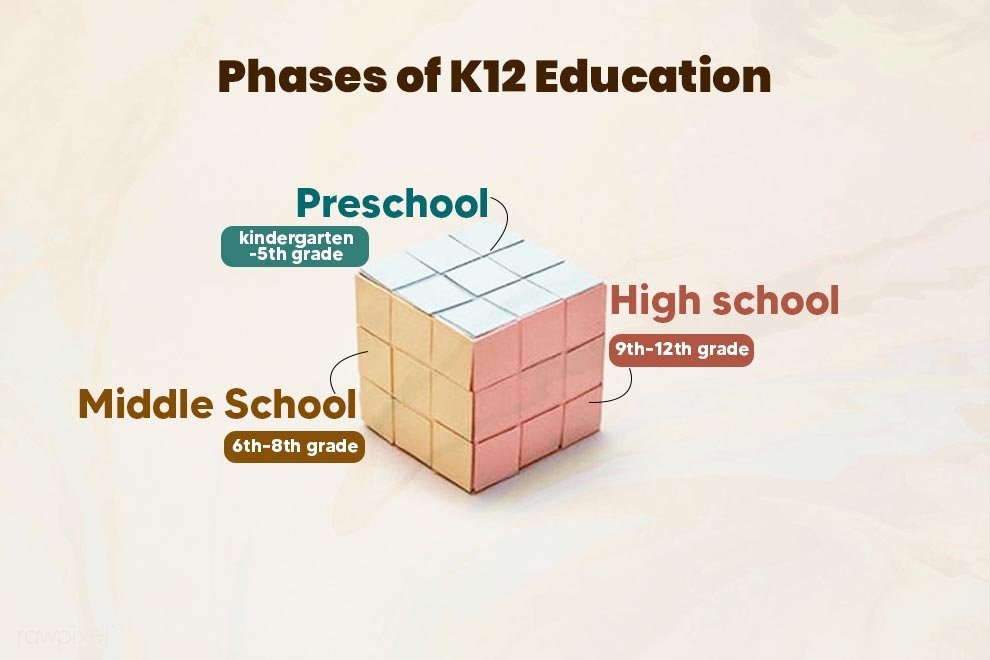Did you know? Analysts valued the global K12 education market at $103.5 billion in 2021 and project it to reach $525.7 billion by 2031, growing at a CAGR of 17.7% from 2022 to 2031. K12 education is an area of interest for many people, whether you’re a parent concerned about your child’s education, a teacher trying to enhance your classroom techniques, or a student looking to maximize your potential. There are many ways to make a difference and ensure that every student receives the best education possible, whether it’s pushing for greater financing, engaging in parent-teacher conferences, or discovering new learning materials.
Get ready to know about the K12 education system.
Defining K12 education
K12 education refers to the education delivered to pupils from kindergarten through 12th grade, aged 5 to 18. It is the basis of a student’s academic journey and sets the path for success in college and beyond. Language arts, math, science, social studies, and physical education are just a few of the disciplines covered in K12.
It should provide students with the required skills and information to seek further education or enter the workforce. Understanding the principles of K12 education is crucial for parents, educators, and students to make educated decisions about their academic journey and ensure a bright future.
Exploring the Phases of K12 Education

K12 education encompasses numerous stages of instruction that respond to pupils’ varying needs and skills. The three phases are:
- Preschool (kindergarten–5th grade)
- Middle school (6th–8th grade), and
- High school (9th–12th grade)
The elementary level emphasizes core disciplines such as reading, writing, and mathematics while also supporting social and emotional development. Middle school builds on these foundations by offering a more comprehensive curriculum that includes science, history, and foreign languages. High school allows students to concentrate on topics of their choice, preparing them for college and the workforce.
The Importance of fundamental skills in K12 Education
Fundamental skills are necessary for success in K12 education. Literacy, numeracy, critical thinking, and problem-solving are examples of these skills. Educators can assist students in developing such skills in meaningful ways by incorporating them into their curriculum and giving them opportunities to apply them in real-world settings.
Teachers can mix reading and writing into lessons to teach literacy skills. They might foster numeracy abilities in children by bringing math principles into everyday tasks, such as counting objects, measuring food, and calculating distances. Making opportunities for children to examine and solve real-world problems can help them develop critical thinking and problem-solving skills.
Assistance for students with learning differences
Not every student learns at the same rate or in the same manner. Individualized help for students with learning challenges is critical. This help can come in a variety of forms, including customized education, accommodations, and assistive technology.
Teachers can support children with learning difficulties by giving visual aids, reducing complex ideas into smaller, more manageable chunks, and offering chances for hands-on learning. Educators can also collaborate with families, special education experts, and other specialists to ensure that pupils receive support.
Syllabus and assessment in K12
Are you curious about the subjects taught in K12 schools, as well as the tasks and exams provided to students?
K12 education is an important stage in a student’s academic career, and it includes a wide range of courses, such as language arts, mathematics, science, social studies, history, art, music, physical education, and foreign languages. But what kinds of assignments and tests can students expect?
Assignments in grades K12 can range from simple tasks like math problems or reading comprehension exercises to more complex assignments, like research papers or presentations. These assignments should evaluate a student’s comprehension of the content given in class and their ability to apply it in real-world circumstances. Assessments can either be official, like standardized tests, or informal, like class participation or assignment completion. They are often used to track a student’s development over time and show areas where they may need more help.
With such a diverse range of subjects and assignments, it’s critical to provide your child with the finest potential support in order for them to excel in their K12 education. There are many strategies to guarantee kids attain their maximum potential, including assisting them with schoolwork, giving additional resources, and getting the help of a tutor.
Technology as a powerful tool for K12 Education
Technology has the potential to be a powerful tool in assisting K12 education. It can improve learning, give access to educational resources, and help instructors, students, and families communicate more effectively. However, the use of technology in the classroom raises some issues, such as equity and access.
To effectively use technology in K12 education, educators need to implement a balanced strategy that integrates technology into the curriculum in meaningful ways while ensuring that all students have access to the right resources and help. In the age of digital learning, finding comprehensive and user-friendly tools for early education has become more accessible. One exemplary model that showcases the seamless integration of technology and curriculum is the online kindergarten learning program offered by ABCmouse. This platform provides a unique educational journey tailored to 5-year-olds, encompassing over 10,000 individual learning activities across 10 levels in core subjects. Not only does ABCmouse facilitate literacy and numeracy skills through interactive lessons, but it also operates across various devices, ensuring that young learners can enjoy continuity in learning whether they’re at home or on the go. The amalgamation of technology with a structured, expert-driven curriculum stands as a testament to how digital solutions can enhance K12 schooling experiences.
K12 education should integrate technology into their curriculum, ensure all students have access to the right resources and help, and link technology use with educational goals for successful implementation.
Multiple perks of K12 education for students
K12 education is the foundation of a student’s academic career, laying the foundations for future success. Besides providing the fundamental knowledge and skills required for college and the workforce, K12 education is critical for a student’s social and emotional development.
It introduces kids to new cultures and viewpoints while also providing opportunities for physical activity and extracurricular activities. With so many advantages to K12 schooling, it is critical to select the best option for your child’s education.
We hope our blog on K12 Education has helped you to gain valuable insights about the industry and that you find it helpful. If you wish to continue expanding your knowledge, keep reading our blogs. We provide valuable information on a variety of topics.










